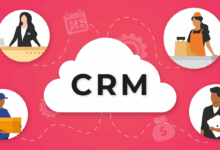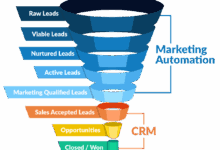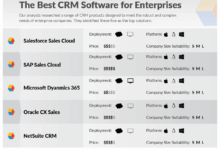Top Cloud-Based CRM Platforms
Top Cloud-Based CRM Platforms are transforming how businesses manage customer relationships. This shift towards cloud-based solutions offers significant advantages over traditional on-premise systems, including increased accessibility, scalability, and cost-effectiveness. We’ll explore the leading platforms, their features, and how to choose the right one for your specific needs, navigating the complexities of implementation and ongoing management.
This exploration will delve into the key features differentiating top contenders like Salesforce, HubSpot, Zoho CRM, Microsoft Dynamics 365, and Pipedrive. We will analyze their respective strengths and weaknesses across various functionalities, from sales and marketing automation to customer service management and data integration. Furthermore, we’ll address crucial considerations such as security, data privacy, and scalability to help you make an informed decision.
Introduction to Cloud-Based CRM Platforms
Cloud-based CRM (Customer Relationship Management) platforms represent a significant shift in how businesses manage customer interactions. Instead of relying on software installed directly on a company’s servers (on-premise), cloud-based CRMs utilize remote servers and the internet to store and access data. This offers several key advantages over traditional methods.
Cloud-based CRM systems offer several compelling advantages over on-premise solutions. The most significant is reduced upfront cost. Companies avoid the expense of purchasing and maintaining servers, software licenses, and IT infrastructure. Scalability is another key benefit; cloud-based CRMs can easily adapt to changing business needs, allowing for quick increases or decreases in storage and processing power as required. Accessibility is enhanced as well, enabling employees to access customer data from anywhere with an internet connection, improving collaboration and responsiveness. Finally, cloud providers typically handle software updates and security patches, freeing up internal IT resources.
Key Features of Cloud-Based CRM Platforms
Top cloud-based CRM platforms typically include a comprehensive suite of features designed to streamline customer interactions and improve business processes. These features are often modular, allowing businesses to select the components that best meet their specific requirements. Common features include contact management (organizing and storing customer information), lead management (tracking potential customers), sales force automation (automating sales tasks), marketing automation (automating marketing campaigns), customer service and support (managing customer inquiries and resolving issues), reporting and analytics (providing insights into customer behavior and sales performance), and integration with other business applications (such as email marketing platforms and e-commerce systems). The specific features and their level of sophistication can vary significantly between different platforms.
Pricing Models of Cloud-Based CRM Platforms
Understanding the pricing models is crucial for selecting a CRM platform that aligns with your budget and business needs. Different vendors offer various options, making direct comparison essential.
| Platform | Pricing Model | Typical Starting Price (USD/month) | Notes |
|---|---|---|---|
| Salesforce Sales Cloud | Subscription-based, tiered pricing | 25 | Price varies significantly based on features and number of users. |
| HubSpot CRM | Freemium model (free plan available) | 0 (free); paid plans start at around 500 | Free plan has limitations; paid plans offer more features and users. |
| Microsoft Dynamics 365 | Subscription-based, modular pricing | 65 (per user) | Pricing depends on chosen modules and number of users. |
| Zoho CRM | Subscription-based, tiered pricing | 14 | Offers a range of plans with varying features and user limits. |
Top Platforms
Choosing the right cloud-based CRM can significantly impact a business’s efficiency and growth. This section provides a detailed comparison of leading platforms, focusing on their key features and functionalities to aid in informed decision-making. We’ll examine user interfaces, sales automation, marketing automation, and customer service management capabilities.
User Interface Comparison: Salesforce, HubSpot, and Zoho CRM
Salesforce, HubSpot, and Zoho CRM each offer distinct user interfaces catering to different user preferences and technical expertise. Salesforce, known for its robust feature set, presents a more complex interface requiring a steeper learning curve. However, its customizability allows for tailored experiences. HubSpot, aiming for user-friendliness, provides a cleaner, more intuitive interface, particularly beneficial for smaller businesses or those new to CRM systems. Zoho CRM occupies a middle ground, offering a balance between functionality and ease of use, making it suitable for a broader range of users and business sizes. The visual appeal and navigation differ significantly; Salesforce leans towards a more traditional business application look, while HubSpot employs a more modern and visually appealing design. Zoho CRM falls somewhere in between, adopting a relatively clean and organized layout.
Sales Automation Capabilities: Microsoft Dynamics 365 and Pipedrive
Microsoft Dynamics 365 and Pipedrive excel in sales automation, albeit with different approaches. Dynamics 365, a comprehensive ERP system with integrated CRM functionality, offers extensive automation capabilities, including lead scoring, opportunity management, and sales forecasting, leveraging its integration with other Microsoft products. Pipedrive, designed specifically for sales teams, prioritizes simplicity and ease of use. Its strength lies in its intuitive pipeline management, enabling efficient tracking of deals and sales progress. While Dynamics 365 caters to larger enterprises with complex sales processes, Pipedrive is a more streamlined solution ideal for smaller teams focusing on efficient deal closure. For example, Dynamics 365 might automate the generation of sales reports based on various data points, while Pipedrive might focus on automated email sequences triggered by specific pipeline stages.
Marketing Automation Features: A Cross-Platform Overview
Many platforms offer robust marketing automation features. Salesforce Marketing Cloud, HubSpot Marketing Hub, and Zoho CRM’s marketing suite provide capabilities such as email marketing, lead nurturing, social media management, and campaign tracking. However, the depth and breadth of these features vary. HubSpot, for instance, is particularly well-regarded for its comprehensive marketing automation tools, offering sophisticated workflows and analytics. Salesforce Marketing Cloud is a powerful, enterprise-grade solution, providing advanced capabilities but potentially at a higher cost and complexity. Zoho CRM’s marketing suite offers a more integrated approach, tightly coupling marketing and sales functionalities. The choice depends on the specific marketing needs and budget. For example, a company focusing heavily on email marketing might find HubSpot’s email capabilities particularly beneficial, while a company requiring advanced analytics might opt for Salesforce Marketing Cloud.
Customer Service Management: Strengths and Weaknesses
Each platform offers customer service management (CSM) capabilities, but their strengths and weaknesses vary. Salesforce Service Cloud, a dedicated customer service platform, provides a comprehensive suite of tools for managing customer interactions, including case management, knowledge bases, and community forums. Its strength lies in its scalability and customization options, making it suitable for large enterprises with complex customer service needs. However, its complexity and cost can be prohibitive for smaller businesses. HubSpot Service Hub provides a more streamlined approach, integrating seamlessly with its sales and marketing tools. It’s ideal for smaller teams seeking a user-friendly solution. Zoho CRM’s customer service features offer a middle ground, providing sufficient functionality without the complexity of Salesforce Service Cloud. A key differentiator is the level of integration with other platforms; Salesforce Service Cloud might offer tighter integration with other enterprise applications, while HubSpot Service Hub focuses on a unified experience within the HubSpot ecosystem.
Integration Capabilities and Customization
The power of a cloud-based CRM lies not just in its core functionality, but in its ability to seamlessly integrate with other business tools and adapt to specific workflows. Effective integration streamlines operations, improves data consistency, and ultimately boosts productivity and ROI. Customization allows businesses to tailor the CRM to their unique needs, ensuring optimal usability and efficiency.
Successful integration between a CRM and other business tools creates a unified system, eliminating data silos and fostering collaboration. This allows for a holistic view of customer interactions across all departments.
Successful CRM Integrations
Examples of successful CRM integrations abound. A marketing automation platform like HubSpot can integrate with Salesforce, allowing for automated email campaigns triggered by CRM events, such as a lead becoming a qualified opportunity. Similarly, an e-commerce platform like Shopify can integrate with Zoho CRM, providing real-time updates on customer orders and purchase history directly within the CRM. This allows sales teams to personalize interactions based on past purchases. Another example is the integration of a help desk system like Zendesk with a CRM like Microsoft Dynamics 365, enabling seamless tracking of customer support interactions and linking them to individual customer profiles for a complete history. These integrations significantly improve efficiency and provide a 360-degree view of the customer.
Workflow and Dashboard Customization
Popular CRM platforms offer extensive customization options for workflows and dashboards. Salesforce, for instance, allows users to create custom objects, fields, and workflows using its declarative configuration tools or its powerful Apex programming language. This allows businesses to model their unique sales processes and automate repetitive tasks. Similarly, Zoho CRM offers a robust workflow automation engine, enabling the creation of automated processes based on predefined triggers and conditions. Dashboards can be customized to display key performance indicators (KPIs) relevant to specific roles and departments. For example, a sales manager might focus on conversion rates and deal closure times, while a marketing manager might prioritize lead generation and campaign performance. This tailored approach ensures that users have access to the most relevant information, leading to improved decision-making.
Hypothetical Customer Interaction Workflow (Salesforce)
Let’s imagine a hypothetical workflow in Salesforce to manage customer interactions from initial contact to post-sales support. A new lead enters the system via a website form. This triggers an automated email acknowledging receipt and providing initial information. Salesforce’s workflow rules then automatically assign the lead to the appropriate sales representative based on territory and product interest. The representative engages with the lead, logging all interactions within the CRM. Upon conversion to an opportunity, the workflow updates the opportunity stage and automatically assigns tasks, such as scheduling a demo or sending a proposal. Post-sale, the workflow triggers automated follow-up emails and surveys to gather feedback and ensure customer satisfaction. Further, service cases are automatically created from support tickets, linking them to the original opportunity and customer profile for a complete interaction history.
API Capabilities of Cloud-Based CRM Platforms
Three popular cloud-based CRM platforms demonstrate diverse API capabilities.
Salesforce’s REST and SOAP APIs provide comprehensive access to its data and functionality. Developers can build custom applications and integrations using these APIs, extending the CRM’s capabilities beyond its built-in features. This allows for highly customized solutions and integrations with virtually any other system.
Zoho CRM’s API offers similar functionality, with REST APIs providing robust access to data and functionalities. Its API supports various programming languages, simplifying integration with other systems. It also offers features like webhooks for real-time data synchronization.
Microsoft Dynamics 365’s APIs allow for integration with various Microsoft products and third-party applications. Its APIs provide access to core CRM data and features, allowing developers to create custom applications and extensions to suit specific business needs. This ensures seamless integration within the Microsoft ecosystem and beyond.
Security and Data Privacy Considerations
Choosing a cloud-based CRM involves careful consideration of security and data privacy. The sensitive nature of customer data necessitates a robust security posture from the provider and diligent security practices from the user. Understanding the implications of data breaches and regulatory compliance is crucial for selecting and effectively utilizing a CRM platform.
Data security and privacy are paramount when selecting a cloud-based CRM. Leading providers invest heavily in infrastructure and processes to protect customer data. However, the responsibility for data security is shared between the provider and the user. Understanding the measures in place, both technically and procedurally, is essential for mitigating risk.
Security Measures Implemented by Leading Cloud-Based CRM Providers
Leading cloud-based CRM providers employ a multi-layered approach to security. This typically includes robust physical security of data centers, network security measures such as firewalls and intrusion detection systems, data encryption both in transit and at rest, regular security audits and penetration testing, and access control mechanisms based on roles and permissions. For example, Salesforce utilizes a combination of these methods, including its Trust Center, which provides transparency into its security practices and certifications. Salesforce also invests heavily in artificial intelligence to detect and prevent security threats in real time. Similarly, Microsoft Dynamics 365 leverages Microsoft’s Azure cloud infrastructure, which benefits from Microsoft’s extensive security expertise and resources. These providers often adhere to industry best practices and comply with relevant security standards such as ISO 27001 and SOC 2.
Data Privacy Regulations and Their Impact on CRM Platform Selection
Regulations like GDPR (General Data Protection Regulation) in Europe and CCPA (California Consumer Privacy Act) in the United States significantly impact CRM platform selection. These regulations grant individuals greater control over their personal data and impose stringent requirements on organizations that collect and process this data. Companies must ensure their chosen CRM platform complies with these regulations, including features that support data subject access requests, data portability, and the right to be forgotten. Failure to comply can result in substantial fines and reputational damage. For example, a company operating in Europe must select a CRM provider that demonstrably complies with GDPR requirements, including data processing agreements that clearly define responsibilities and data protection measures.
Best Practices for Securing Data Within a Cloud-Based CRM Environment
Implementing best practices is crucial for enhancing data security within a cloud-based CRM environment. This includes regularly updating the CRM software and its associated plugins to patch security vulnerabilities, enforcing strong password policies and multi-factor authentication, restricting access to sensitive data based on roles and responsibilities (Principle of Least Privilege), regularly backing up data to ensure business continuity and data recovery, and implementing data loss prevention (DLP) measures to prevent sensitive data from leaving the organization’s control. Regular security awareness training for employees is also vital to prevent human error, a significant source of security breaches.
Factors to Consider When Assessing the Security and Privacy Features of a CRM Platform
When evaluating a CRM platform’s security and privacy features, several factors should be considered. These include:
- The provider’s security certifications and compliance with relevant regulations (e.g., ISO 27001, SOC 2, GDPR, CCPA).
- Data encryption methods used both in transit and at rest.
- Access control mechanisms and role-based permissions.
- Data backup and recovery procedures.
- Incident response plan and procedures.
- Transparency of the provider’s security practices and policies.
- Data residency and transfer policies.
- Customer support and responsiveness to security concerns.
Scalability and Future Trends
Cloud-based CRMs offer a significant advantage over on-premise systems in their ability to adapt to the fluctuating needs of a growing business. This scalability is a key factor driving their widespread adoption across various industries, from startups to multinational corporations. The inherent flexibility of the cloud allows for seamless expansion of resources, ensuring that the CRM remains a valuable tool regardless of business growth trajectory.
The elasticity of cloud-based infrastructure allows businesses to easily adjust their CRM capacity. As a company expands its sales team, for instance, it can quickly add user licenses and increase data storage without significant upfront investment or lengthy implementation periods. Conversely, during periods of slower growth, resources can be scaled back, optimizing costs and preventing resource wastage. This contrasts sharply with on-premise systems, which often require significant capital expenditure and time commitment for upgrades and expansions.
AI Integration in Cloud-Based CRMs
The integration of Artificial Intelligence (AI) is rapidly transforming the capabilities of cloud-based CRM platforms. AI-powered features are enhancing efficiency, improving customer experience, and providing valuable insights for strategic decision-making. This integration is moving beyond simple automation tasks, incorporating more sophisticated predictive analytics and personalized customer interactions. For example, AI can analyze customer data to predict churn, personalize marketing campaigns, and automate repetitive tasks such as lead qualification and appointment scheduling, freeing up sales teams to focus on higher-value activities.
The benefits of using AI-powered features within a CRM are substantial and far-reaching:
- Improved Lead Scoring and Qualification: AI algorithms can analyze various data points to accurately assess the potential of each lead, prioritizing those most likely to convert into paying customers.
- Enhanced Sales Forecasting: Predictive analytics can provide more accurate sales forecasts, enabling businesses to make better resource allocation decisions.
- Personalized Customer Interactions: AI can personalize customer communication based on individual preferences and past interactions, fostering stronger customer relationships.
- Automated Task Management: Repetitive tasks such as data entry and email marketing can be automated, freeing up employees for more strategic work.
- Proactive Customer Support: AI-powered chatbots can provide immediate support to customers, resolving issues quickly and efficiently.
Mobile Accessibility and Cross-Platform Compatibility
Modern cloud-based CRMs are designed with mobile accessibility as a core feature. Sales teams and customer service representatives can access crucial customer data and interact with the system from anywhere, anytime, using smartphones or tablets. This mobility is crucial in today’s fast-paced business environment, enabling quick responses to customer inquiries and efficient management of sales processes, regardless of location. Moreover, many platforms offer seamless cross-platform compatibility, ensuring that data and functionality are accessible across various devices and operating systems. This eliminates the need for separate desktop and mobile applications, streamlining workflows and improving overall efficiency. For example, a salesperson can update a customer’s information after a meeting on their tablet and instantly have that information accessible to their colleagues on their desktop computers.
Predictions for the Future of Cloud-Based CRM Platforms
In the next five years, we can expect to see several key developments in cloud-based CRM platforms. Firstly, the integration of AI and machine learning will become even more sophisticated, leading to more accurate predictions, personalized experiences, and automated workflows. Secondly, the emphasis on data security and privacy will continue to grow, with platforms adopting more robust security measures to protect sensitive customer data. Thirdly, we can anticipate increased interoperability between different cloud-based applications, allowing businesses to seamlessly integrate their CRM with other essential tools, such as marketing automation and e-commerce platforms. Finally, the rise of low-code/no-code development platforms will empower businesses to customize their CRM solutions without extensive coding expertise, fostering greater agility and adaptability. For instance, Salesforce’s continued investment in Einstein AI and its various integrations exemplifies the ongoing trend of AI-powered CRM advancements. Similarly, the increasing popularity of low-code platforms like Zoho Creator showcases the growing need for customizable and easily deployable CRM solutions.
Choosing the Right Platform for Your Business
Selecting the ideal cloud-based CRM requires careful consideration of your business’s unique needs and resources. The right platform can significantly enhance efficiency and productivity, while the wrong choice can lead to frustration and wasted investment. This section provides a structured approach to choosing the best CRM for your specific situation.
Factors Influencing CRM Selection for Different Business Sizes
The optimal CRM varies greatly depending on business size. Small businesses (under 50 employees) typically need a user-friendly system with basic features and affordable pricing. Mid-sized businesses (50-250 employees) often require more advanced features like sales forecasting and marketing automation. Large enterprises (over 250 employees) need robust, scalable solutions capable of handling complex data and integrating with numerous other systems. Consider these aspects when evaluating different platforms: the number of users, required features, integration needs, and budget constraints. For example, a small startup might find a platform like HubSpot CRM suitable due to its free plan and ease of use, while a large corporation might opt for Salesforce Sales Cloud given its extensive capabilities and scalability.
Evaluating Cost-Effectiveness of CRM Platforms
Cost-effectiveness involves analyzing both initial investment and ongoing expenses. Initial costs include setup fees, implementation costs, and potentially custom development. Ongoing costs include monthly or annual subscription fees, user licenses, data storage, and support services. It’s crucial to assess the return on investment (ROI) – quantify how the CRM will improve sales, marketing efficiency, or customer service, and compare that to the total cost of ownership. For instance, a CRM that automates lead generation and improves sales conversion rates might justify a higher initial investment through increased revenue. Conversely, a less expensive platform with limited functionality might not provide sufficient value to offset its cost if it doesn’t meet your business’s core needs.
Decision-Making Matrix for Comparing CRM Options
A decision matrix provides a structured comparison of different CRM options. The following matrix uses a scoring system (1-5, with 5 being the best) to evaluate key criteria. Adapt this matrix to reflect your specific priorities.
| Criteria | Platform A | Platform B | Platform C |
|---|---|---|---|
| Cost | 4 | 3 | 5 |
| Ease of Use | 5 | 4 | 3 |
| Features | 3 | 5 | 4 |
| Integration Capabilities | 4 | 2 | 5 |
| Scalability | 3 | 4 | 5 |
| Customer Support | 4 | 5 | 3 |
| Security | 5 | 4 | 4 |
Choosing a CRM is a strategic decision. Prioritize features that directly support your business goals and align with your budget. Don’t be swayed solely by marketing hype; thoroughly evaluate each platform’s capabilities and limitations.
Epilogue
Ultimately, selecting the ideal cloud-based CRM platform hinges on a careful assessment of your business’s unique requirements. By understanding the diverse features, integration capabilities, and security protocols of leading platforms, you can confidently choose a solution that streamlines operations, enhances customer engagement, and fuels sustainable growth. Remember to prioritize scalability, data security, and a user-friendly interface to maximize your return on investment.





